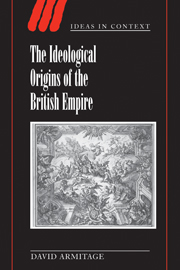Book contents
- Frontmatter
- Contents
- Acknowledgements
- 1 Introduction: state and empire in British history
- 2 The empire of Great Britain: England, Scotland and Ireland c. 1542–1612
- 3 Protestantismand empire: Hakluyt, Purchas and property
- 4 The empire of the seas, 1576–1689
- 5 Liberty and empire
- 6 The political economy of empire
- 7 Empire and ideology in the Walpolean era
- Bibliography
- Index
- Ideas in context
2 - The empire of Great Britain: England, Scotland and Ireland c. 1542–1612
Published online by Cambridge University Press: 06 July 2010
- Frontmatter
- Contents
- Acknowledgements
- 1 Introduction: state and empire in British history
- 2 The empire of Great Britain: England, Scotland and Ireland c. 1542–1612
- 3 Protestantismand empire: Hakluyt, Purchas and property
- 4 The empire of the seas, 1576–1689
- 5 Liberty and empire
- 6 The political economy of empire
- 7 Empire and ideology in the Walpolean era
- Bibliography
- Index
- Ideas in context
Summary
… realmis ar nocht conquest be buikis bot rather be bluid.
The ideological history of the relations between the Three Kingdoms of England, Scotland and Ireland in the sixteenth century reveals the inseparability of–and, in many ways, the identity between – stateformation and empire-building in the early modern period. For the last half-century, historians have argued that the origins of English (and, later, British) imperial ideology can be found in English policy towards Ireland under the Tudors. The governing assumptions of the English official mind, according to this argument, were that Ireland, though a kingdom after 1541, should be treated as if it were a colony, especially during the ‘New English’ period of settlement beginning in the 1560s; that the Irish were barbarians, comparable to the inhabitants of the western hemisphere encountered by the Spanish; and that the English had a duty to civilise and to Christianise (that is, to Protestantise) both the Gaelic Irish and the Catholic ‘Old English’ descendants of the Anglo-Norman settlers of the twelfth century. The continuity of personnel, similarity of methods and justifications, and parallel relations between Ireland and the new settlements of the late Elizabethan and early Jacobean periods together created a narrative of English colonialism that runs in a straight line from England, through Ireland, to the Caribbean and thence the eastern seaboard of North America. In this account, maritime enterprise transformed state-formation into empire building in the British Atlantic world along a path running from east to west, and from England to America, with Ireland as the crux of a comprehensive English ‘westward enterprise’.
- Type
- Chapter
- Information
- The Ideological Origins of the British Empire , pp. 24 - 60Publisher: Cambridge University PressPrint publication year: 2000



